
Abstract: Global experts and scholars jointly discuss the key role of cross-border cooperation in building the future education ecology
On December 14,2024, the annual Yidan Education Forum was successfully concluded in Qianhai, Shenzhen. This BBS by Beijing normal university future education advanced innovation center, Chen Yidan foundation, a Dan education research institute, tencent mutual entertainment social value exploration center, a prize, Exploratorium exploration museum, the Chinese university of Hong Kong (Shenzhen) before the sea international affairs and Macao city university school of education as a BBS joint host, from mainland China, Hong Kong, China, Macao, China, and Singapore, the United States and other countries and regions of experts and scholars, education practitioners, enterprise representatives to "build the future ecological: learning cross-border design" as the theme. The forum pointed out that in the context of globalization and technological innovation, cross-border cooperation has become the key to promoting the systematic and innovative reform of education, and education needs to respond actively and forward-looking to the changing needs of The Times.
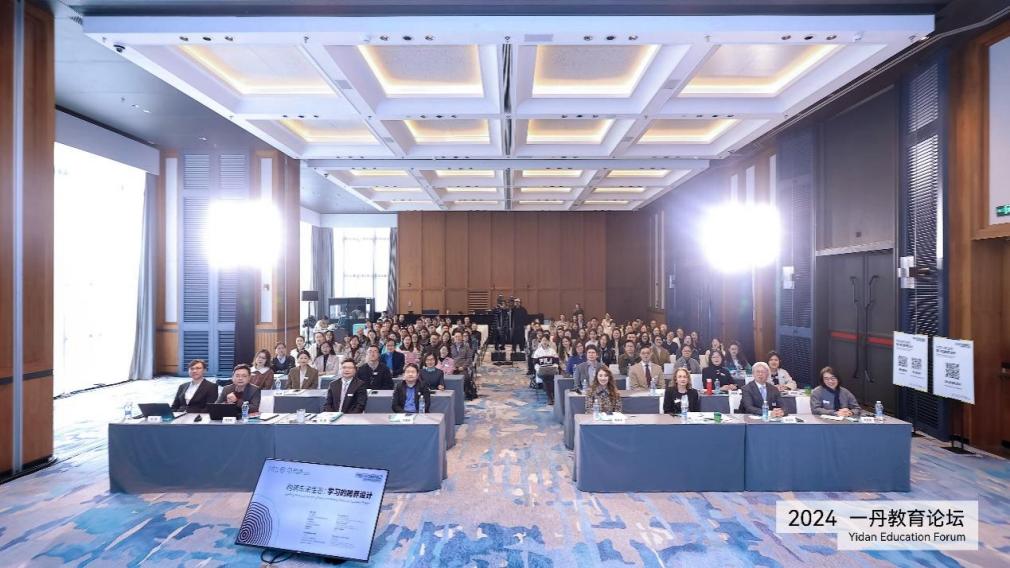
The meeting site
This BBS to "build the future ecological: learning of cross-border design" as the theme, invited from mainland China, Hong Kong, China, Macao, China, and Singapore, the United States and other different regions and national experts and scholars, education practitioners, enterprise representatives, etc., to discuss the era of artificial intelligence ecological vision of future education crossover and collaboration, the education frontier ideas, mode, methods and case to carry out academic discussion, achievements, and released for the third year of "future learners" series of keynote report.
Professor Yu Shengquan, executive director of the Future Education Innovation Center of Beijing Normal University, director of the Joint Laboratory of the Ministry of Education and China Mobile, and deputy director of the National Teaching Steering Committee on Basic Education Informatization, delivered the opening speech and opening speech for the forum, describing the new ecology of the future of schools in the intelligent era. He believed that in order to develop talents in the intelligent era, this transformation is reflected in five aspects: the transformation of the school space in the future, the talent training mode of the future school, the teaching evaluation of the future schools and the education management mode of the education service of the future schools.
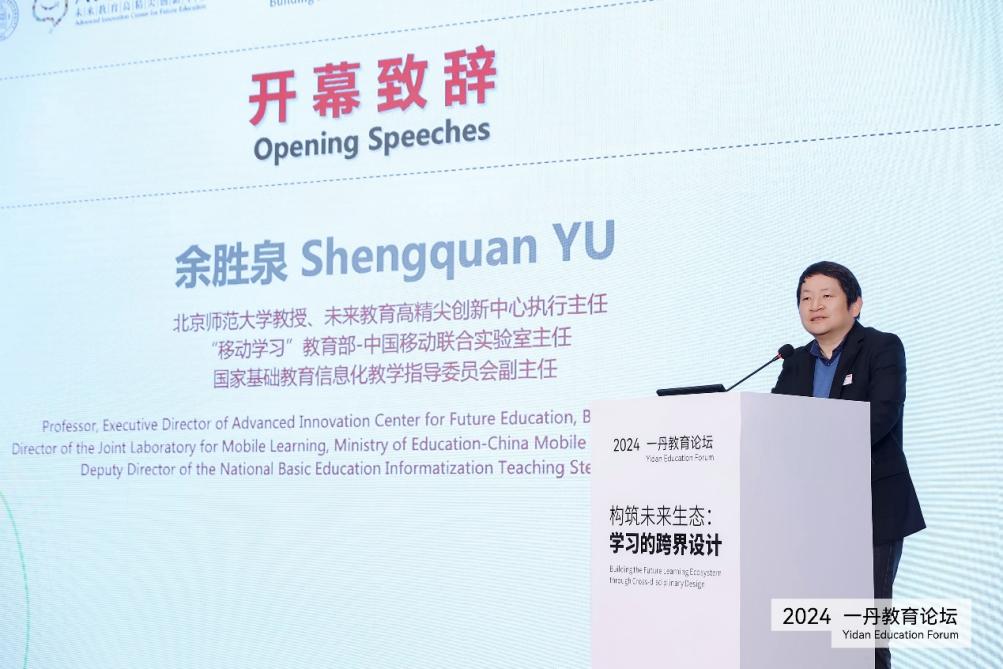
Yu Shengquan delivered a speech and made a report
Rao Ruirui, secretary-general of the Chen Yidan Foundation, said in his speech that the industry is paying close attention to the possible impact of AI on our life, work, education and many other aspects. She believes that future education should pay attention to the social and philosophical issues behind AI, and base it on human values to preserve human nature. The goal of education is to cultivate the ability of the next generation to integrate with AI, so that human intelligence can be expanded without being replaced by AI. Rao further believes that the future is highly uncertain, and only through continuous practice and the verified scenes are rich enough can we get a comprehensive perspective and responsible judgment.
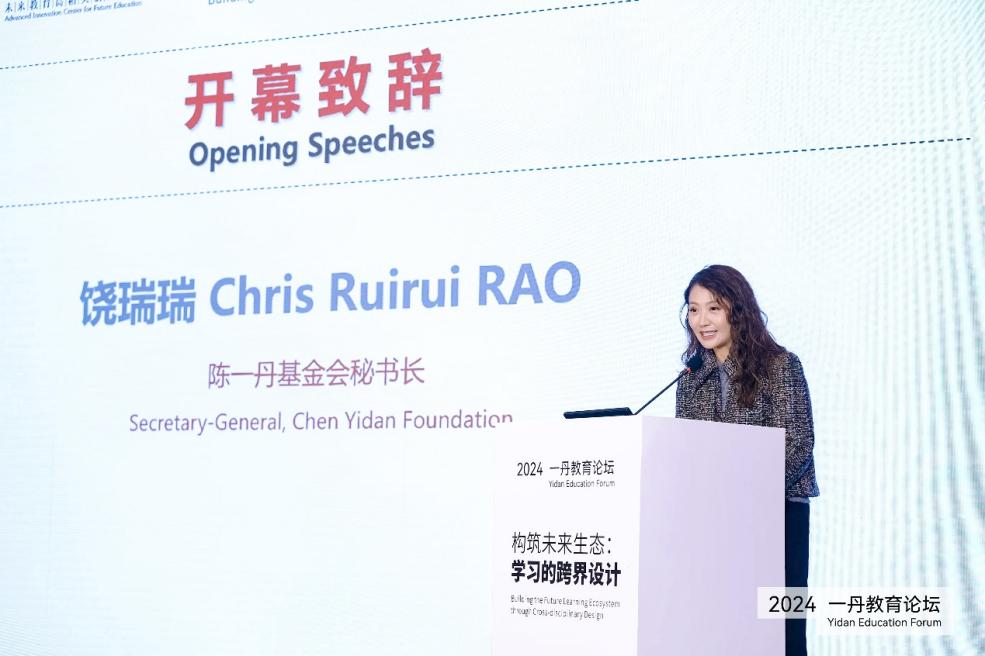
Rao Rui-rui delivered a speech
Wang Chen, professor of the Department of Education of Beijing Normal University and secretary general of the Education History Branch of the Chinese Society of Education, delivered a keynote report on "CMYK: Cross-boundary Design of Learning". He pointed out that the core of AI education to become people is the generation of neurons, and it is the deep learning of nerves. Take this model as a comparison to complete the generative AI path of CMYK education expression, which is our project meta-chain. In this process, it leads the "learners" to continue their self-generation, including neurons, engineering practices, and ecological and educational communities. And these generation, and the generation of different dimensions, make it stack into a three-dimensional neuronal network synergy. It is not only a union of individual PU, but also a stereostructured network of neurons for educational communities and learning ecology.
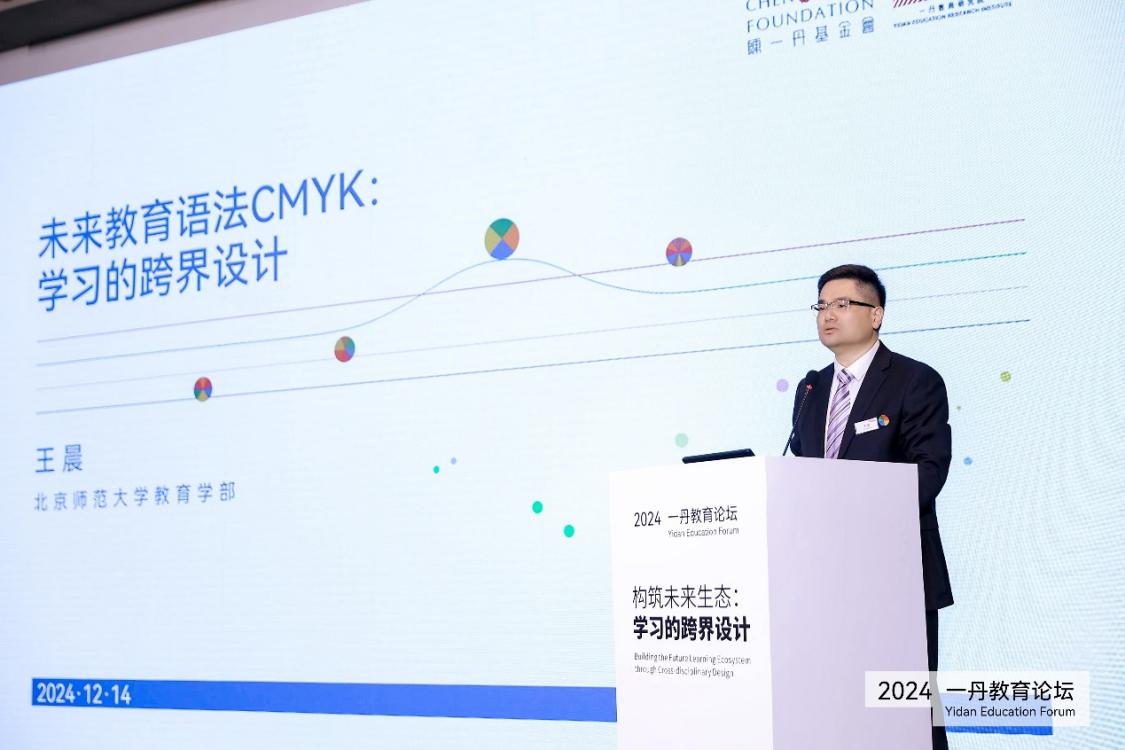
Wang Chen made a report
Wang Jinze, partner and executive vice president of PINWU and executive deputy director of Rong Design Library, made a theme report on "backward and forward". He pointed out that for designers, we wanted to create more things, to create more home products, products, industrial products, and have been moving forward. And our previous design is to meet the trend, to meet the consumer insight, to meet the form to go, so everyone's design will be more and more similar. The design of plagiarism is not because we are willing to copy, but because we do not look back. If every designer is thinking about the traditional culture of this nation, thinking about my method of life, the wisdom and philosophy of our nation, and the unique materials and application methods of our nation, you also made a stool, which looks almost like me, you did not copy, you are actually innovation.

Wang Xingze made a report
At the same time, the conference also set up three points BBS, guests around "the future education of interdisciplinary collaboration: research, industry, public welfare""future education of cross scene collaboration: family, school, society, AI""build future learning ecology: global, China, large bay area, former sea" issues such as online audience further communication, discusses the future education diversity and crossover, emphasizes the education under the era of AI ecological reconstruction, the importance of personalized learning, and cross-cultural, cross language and interdisciplinary education in the key role of cultivating innovative talents.
Participants proposed that technology integration, gamified learning, and inquiry-oriented teaching methods can enhance the inclusiveness, resilience, and innovation of education, and build a student-centered future learning ecosystem that can adapt to the needs of the rapidly changing world. Participants agreed that building cross-border collaboration in future education requires positive interaction and deep integration between various elements within the education ecosystem, as well as close cooperation and cross-border integration between different subjects, learning scenarios, social fields and global regions.
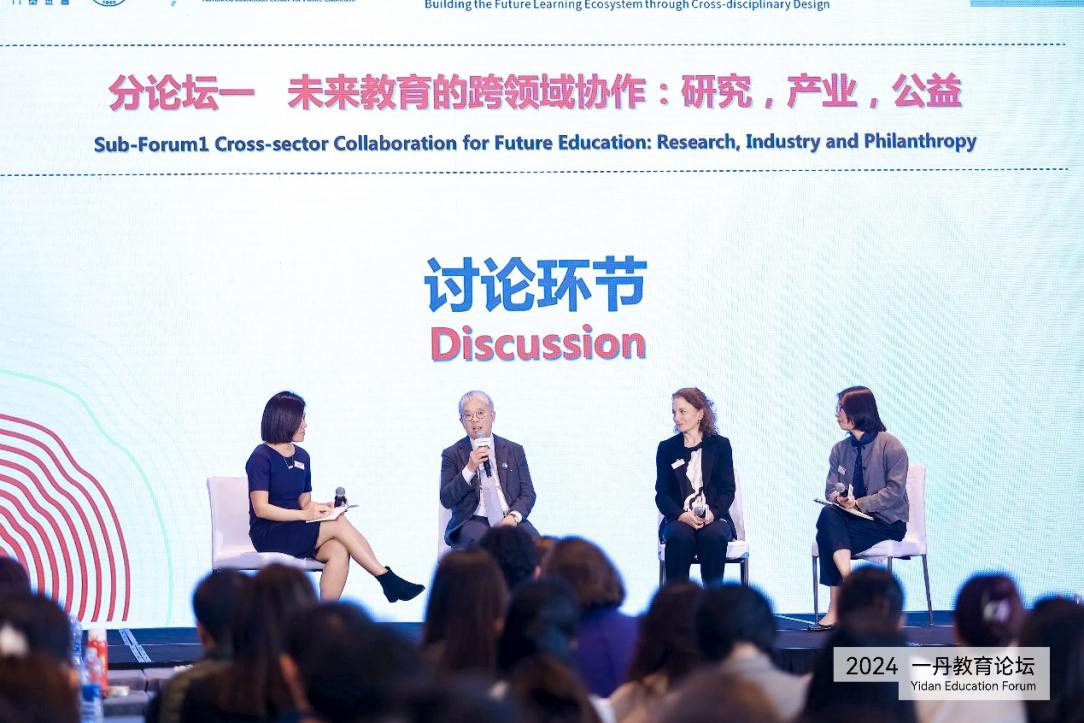
From research, industry, public welfare, explore the future of education interdisciplinary collaboration (from left to right): a Dan award foundation project director Fu Yu ting, the Chinese university of Hong Kong sociology professor zhi-yu zhao, a Dan award foundation global affairs director Lucy Lake, (Singapore) Nanyang technological university national education institute / education research, associate professor and vice President of Luo Jingyi
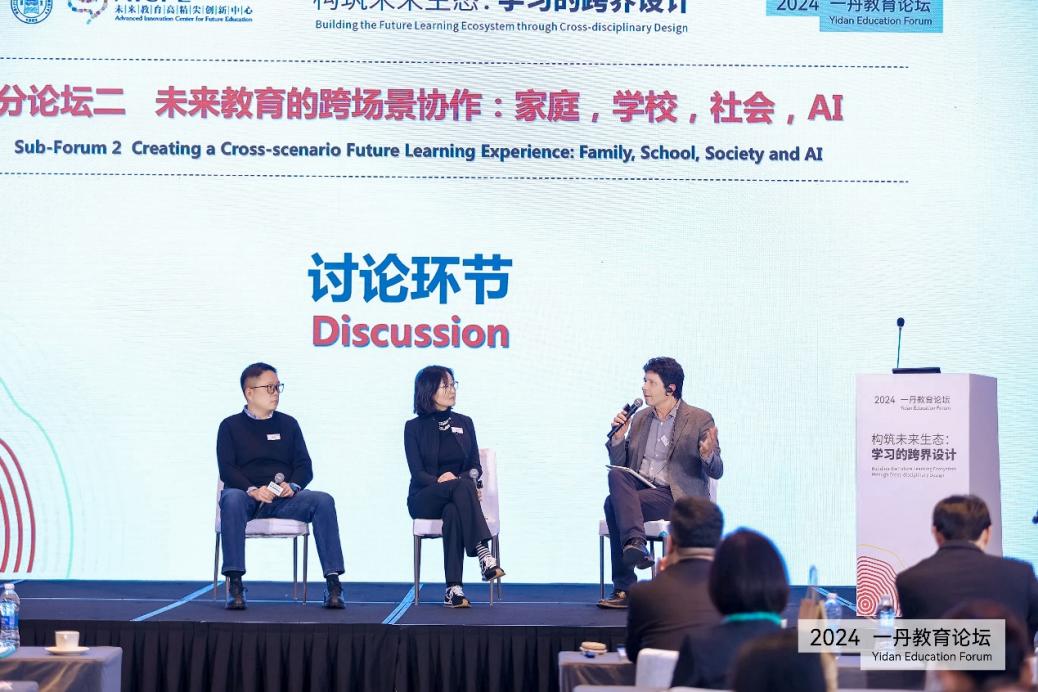
In the era of artificial intelligence, how families, schools and society realize cross-scene collaboration (from left to right): Cao Ying, head of industry Exploration Group of Tencent Social Value Exploration Center of Tencent Interactive Entertainment, Tong Yuzhou, director of global Interactive Learning Department of School of Design and Creativity, Tongji University, and Mike Petrich, director of Informal Learning Center of Exploratorium Exploration Museum (US)
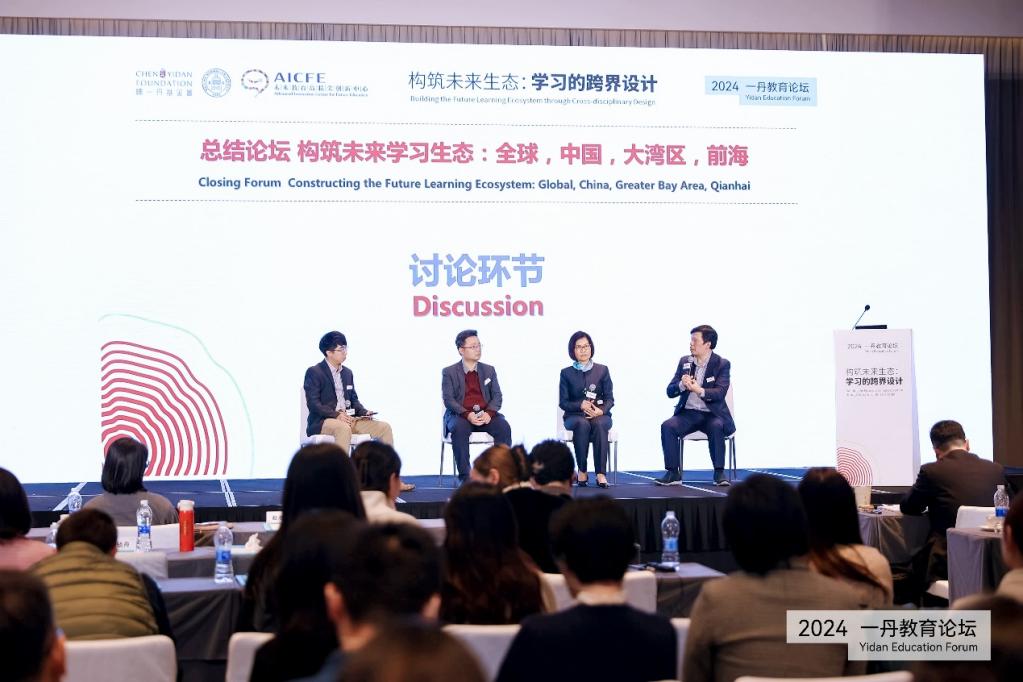
A large bay area of Guangdong education ecological construction is one of the important issues (from left to right): the Chinese university of Hong Kong (Shenzhen) sea international affairs institute associate researcher huang ping, associate professor of education, city university of Macao school of education, professor Cheng Liying, Hong Kong large bay area education integration development think-tank, President Chen Jinyun
Finally, the closing ceremony was presided over by Zhang Xiang, director of the Cooperation and Development Office of the Future Education Advanced Innovation Center of Beijing Normal University.
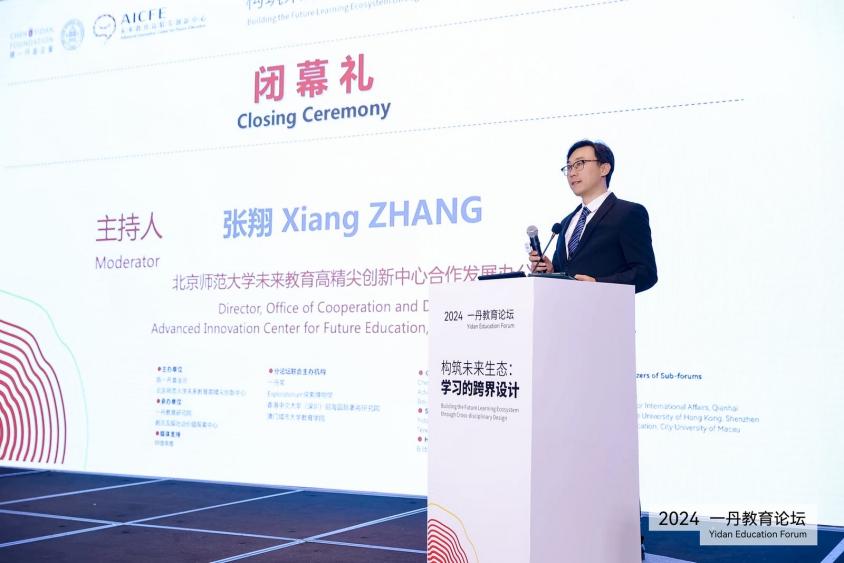
Zhang Xiang presided over the closing ceremony
It is worth mentioning that the forum audience present this year is also very crossover. They come from different industries and backgrounds in Beijing and the Guangdong-Hong Kong-Macao Greater Bay Area, including education, public welfare, technology, art, design, business, consulting, etc.
It is reported, "one Dan education BBS" is sponsored by Chen Yidan foundation, one Dan education institute of international education theme BBS, designed around the global and Chinese education innovation frontier, build education and social experts dialogue platform, has been held for five consecutive years, the research was officially published, and included by the national library, etc.